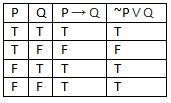A Lesson in Logic
I’m soaking up the amazing academic atmosphere in Kalamazoo, Michigan right now, but even that won’t stop the logic from getting through. Today’s substitution rule is the first really interesting one, and might prove to be a bit challenging. We’re going to transform a material conditional into something else, like magic. Well, okay, not like magic. There will be no wand waving. Unless you bid on this kickass amazing wand from Magical Alley during Headshots from the Heart, that is! We’ll be auctioning it live during the event on May 26th and 27th, and 100% of the proceeds will go to children’s hospitals! You can find it and a lot of other awesome auction items on our loot page! Just saying. Anyway, logic!
Conditional exchange is the process of changing a material conditional into a disjunction, and works by changing this:
P → Q
Into this:
~P ∨ Q
How can we justify this? The truth tables for each of the statements are exactly the same.  Saying that P implies Q is logically equivalent to saying that P is not the case or Q is the case. The language around some of the or statements can get tricky, which is why we use the formalism instead. We can see this in use in an example, pulled from the characters of Maurice Sendak’s “Where the Wild Things Are”. Because that book is awesome. If you haven’t read it, the upshot is that Max, a bit of a wild child, travels to the land of the Wild Things and becomes their king. But he gets lonely, and misses his home, and gives up being king to go home and eat a good dinner. I have in no way done it justice, and if you really can’t wait to read it, check out this great reading. Anyway, while Max was sitting under the tree feeling lonely, his train of thought might have gone something like this.
Saying that P implies Q is logically equivalent to saying that P is not the case or Q is the case. The language around some of the or statements can get tricky, which is why we use the formalism instead. We can see this in use in an example, pulled from the characters of Maurice Sendak’s “Where the Wild Things Are”. Because that book is awesome. If you haven’t read it, the upshot is that Max, a bit of a wild child, travels to the land of the Wild Things and becomes their king. But he gets lonely, and misses his home, and gives up being king to go home and eat a good dinner. I have in no way done it justice, and if you really can’t wait to read it, check out this great reading. Anyway, while Max was sitting under the tree feeling lonely, his train of thought might have gone something like this.
1. I will either not go, or be loved. (~G ∨ L)
2. I will go. (G)
3. Therefore, I will be loved. (L)
Well, there’s no rule of inference that leads to that conclusion from those premises. We have to use conditional exchange.
4. If I go, then I will be loved. (G → L) Conditional Exchange from 1
5. Therefore I will be loved. (L) Modus Ponens from 2 and 4.
Max’s logic is valid after all. And to spoil the ending, it was also sound. He ate a delicious dinner, and lived happily ever after. Maurice Sendak died this week, but he’ll live on through all the kids he moved with his book, and I’m one of those. Or at least, I enjoy a good rumpus now and again. And a good dinner. Anyway, thanks for reading, and I’ll leave you with a slightly more complicated proof this week.
1. L ∨ ~D
2. D ∨ D
3. (L ∨ S) → G
4. G
